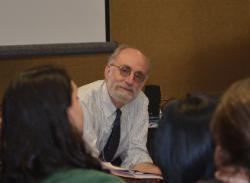"Around the College" is no longer being updated.
View current SUNY Empire Stories.
November 5, 2015
Faculty Workshop on Forgiveness at Academic Conference
 Is forgiveness necessary to heal and move on? Can forgiveness be premature? Can one forgive on a personal level and still seek justice on the societal level?
Is forgiveness necessary to heal and move on? Can forgiveness be premature? Can one forgive on a personal level and still seek justice on the societal level?
Faculty took a 360-degree look at forgiveness in light of the racially motivated shootings at a Charleston, S.C. church and other instances of people of color who have lost their lives at the hands of law enforcement and others due to presumed racial bias: Eric Garner in Staten Island, Walter Scott in Charleston and Freddie Gray in Baltimore.
The conversation was sparked after Nadine Wedderburn, assistant professor and mentor at the college’s Schenectady location, introduced the session by reciting the facts of the Charleston shooting and raising the question of whether the forgiveness offered by the families of the nine victims could be premature. “This quick offer of forgiveness made me question the value of the victims’ lives,” she said. “Their bodies were barely cold – how were they able to offer forgiveness so soon? I call this ‘premature forgiveness,’” she said, adding that it served “no useful function” and likening it to a runner who declares victory before the race is done.
From there, from various vantage points in the room, different voices began to speak on the topic. Anastasia Pratt, mentor/unit coordinator with the college’s Plattsburgh location, said that the offer of forgiveness may have been necessary “to keep their souls intact.”
Mentor Alan Mandell, college professor of Adult Learning and Mentoring (pictured above), took the position that forgiveness could be premature. He brought into the conversation Holocaust survivors who said that they could forgive many things, but not the mass murder of European Jews.
Could premature forgiveness trivialize “real black suffering and grief,” while being comforting to whites? The rushed forgiveness could “contribute to a cycle of attacks and abuse.”
Bob Carey, mentor and unit coordinator at the Brooklyn location, said, “Choosing to act as if racism does not exist means it will never go away. While it is the family’s prerogative where, and whether they choose to be forgiving, larger society doesn’t have that option. Racism in the U.S. is as real today as it has been in the past.”
The question then was, could personal forgiveness be offered even while justice is pursued? Does a personal act of forgiveness preclude acknowledging the wrong? Can the act of overcoming injustice be a collective act, while forgiveness remains a personal decision?
Some faculty noted that in American culture, the whole concept of forgiveness has a Christian connotation. “Murky theological issues” are raised, said Dana Gliserman Kopas of the Center for Distance Learning. “We are talking here about a brand of forgiveness, a particular Christian version. I experience a totally different thing…”
Menoukha Case, academic area coordinator, History and Culture, with CDL, spoke about how in the Native American culture, there was often a concept of replacement, not forgiveness. For example, if someone took the life of a son, then all the things that son was to the family would have to somehow be restored. The one truly wronged is the one who has lost life, she maintained, and it is that victim that has the right to forgive, although she acknowledged injury on the part of the families.
In the end, there were more questions than definite answers. Dean Gerald Lorentz, of the college’s Northeast region, noted how the whole topic seemed to affect the genders differently. Noting only four males in the room, he said that forgiveness could be gender-based. “Men tend to be more vengeful,” he said.
